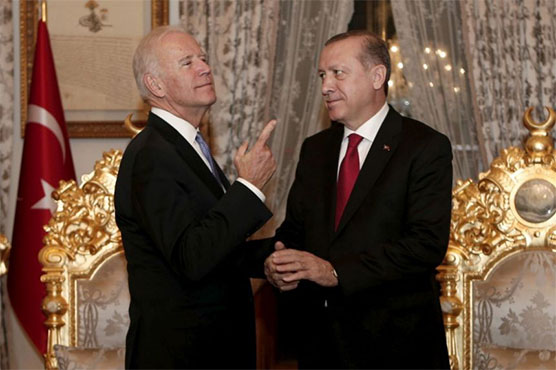Biden speaks with Turkey before expected Armenian genocide recognition

US is expected to make the landmark recognition of the Armenian genocide today.
WASHINGTON (AFP) - US President Joe Biden on Friday spoke to an alarmed Turkey a day before he is expected to make the landmark recognition of the Armenian genocide.
Saturday marks the 106th anniversary of the waning Ottoman Empire s mass killings of hundreds of thousands of Armenians, whose descendants have pressed hard for the world to describe the massacres as genocide.
Turkey adamantly rejects the label of genocide and President Recep Tayyip Erdogan spoke by telephone Friday with Biden, who took office in January vowing a new focus on human rights.
The White House did not mention the controversy in a readout of the call, saying only that Biden urged a "constructive bilateral relationship with expanded areas of cooperation and effective management of disagreements."
In a potential sign that the two leaders want to avoid a long-term deterioration of relations, the White House said that Biden and Erdogan would meet each other during the NATO summit in Brussels in June.
Asked Friday if Biden would make a statement, State Department deputy spokesperson Jalina Porter told reporters Friday: "When it comes to the Armenian genocide, you can expect an announcement tomorrow."
A State Department official later clarified that her use of the term "Armenian genocide" did not signify a shift had already been made by the United States, and that any changes would come from the White House.
Biden, who during his decades as a senator forged close relations with the Armenian-American and Greek-American communities, promised during his presidential campaign to recognize the Armenian genocide.
Speaking in a statement on April 24, 2020 as a presidential candidate, Biden said: "We must never forget or remain silent about this horrific and systematic campaign of extermination."
"If we do not fully acknowledge, commemorate, and teach our children about genocide, the words never again lose their meaning. "
- Landmark move -
Turkey insists that the killings and expulsions of ethnic Armenians in what was then the Ottoman Empire were not genocide but a result of the wider conflict in World War I.
Turkish pressure has not stopped some major countries, like France and Germany, from declaring the episode to have been genocide, but many states have held back from fully official recognition.
US recognition would be a massive victory for campaigners. Despite decades of lobbying by the Armenian-American community, successive US presidents have skirted the controversy out of worry about a rupture with NATO ally Turkey.
Turkish Foreign Minister Mevlut Cavusoglu warned this week that Biden s move would sour bilateral relations.
"If the United States wants to worsen ties, the decision is theirs," he said.
Aram Hamparian, executive director of the Armenian National Committee of America, said that Biden would be "effectively ending the longest lasting foreign gag-rule in American history."
"This principled stand represents a powerful setback to Turkey s century-long obstruction of justice for this crime, and its ongoing hostility and aggression against the Armenian people," he said.
He voiced hope for greater US alignment against Turkish-backed Azerbaijan, which last year won back swathes of territory controlled by Armenia since a war in the 1990s.
Biden s relations have already been sour with Erdogan. Before entering office, Biden described the Islamist-oriented leader an autocrat and called for support to the opposition.
Tensions have risen with Turkey in recent years over its purchase of a major air defense system from Russia -- the chief adversary of NATO -- and its incursions against US-allied Kurdish fighters in Syria.
The Biden administration has criticized Erdogan over homophobia after officials used language belittling the LGBTQ community when curbing protests.

